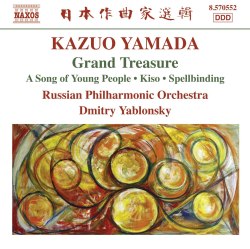| 
|
Kazuo YAMADA (1912-1991)
A song of young people (1937) [11.17]
Kiso, old Japanese melody, Op.12 (1939) [15.20]
Spellbinding, ballet, Op.13 (1940): Symphonic Suite India [13.19]
Grand Treasure, Op.20 (1944) [15.09]
Russian Philharmonic Orchestra/Dmitry Yablonsky
rec. Studio 5, Russian State TV and Radio Company Kultura, Moscow, 18-22 May 2007
NAXOS 8.570552 [55.06]
Leaving aside composers who write for purely commercial considerations, it has always been my experience that most composers - including myself - are driven by internal communicative demons which compel them to write regardless of any other considerations. This makes the examples of those who suddenly give up composition in middle life difficult to comprehend, except as a sudden failure of the creative impulse. One thinks of Sibelius burning his Eighth Symphony, or Rossini abandoning large-scale works for little ‘sins of old age’ for private performance. Yamada however is another composer who seems to belong to this category. Before 1945 he was regarded as one of the leading orchestral composers of Japan, but after the age of 33 he not only wrote nothing further for the medium, but actively discouraged performances of the works he had written before that date. During his later life he was remembered by his work as an orchestral conductor and as the composer of delicately scented French-influenced songs - although even there he was overshadowed by his contemporary confusingly named Kosaku Yamada. When an attempt was made to perform his Kiso he claimed that the score had been lost, and that in any event he was “no longer willing to have it performed”.
The booklet note with this issue by Mari Saegusa - from which the quotation in the previous paragraph is taken - does not make any attempt to analyse this apparent truncation of Yamada’s compositional urge. Nor does the music itself, as heard on this disc, show any signs of a falling off in quality. The earliest piece here, A song of young people, was written for a competition when the composer was twenty-five, and clearly shows the influence of Mahler in its use of chamber-like textures in the context of a large orchestra; Yamada had studied under Mahler’s pupil Klaus Pringsheim. The work was deliberately intended as a rejection of the “facile exoticism” of Japanese nationalism that had become the vogue, and indeed the results do not sound in the least Japanese. Nor unfortunately do they sound very memorable. We have a succession of brief episodes tacked together, concluding with a saxophone solo which dies away in muttering strings and timpani. There are some piquant orchestral effects, but the result does not cohere, and it is perhaps notable that the composer did not assign an opus number to the work.
Kiso also opens with a saxophone solo, but it is a more immediately approachable work perhaps because it draws on two Japanese folk tunes for melodic material. The Mahlerian overtones remain evident a couple of years later, but one also detects echoes of Holst’s Japanese Suite and elements of Bartók’s treatments of Hungarian folk material. The ‘symphonic suite’ from the ballet Spellbinding is even more Bartókian - with some passages distinctly recalling The miraculous mandarin - although not at all ‘symphonic’ in structure. Despite the fact that it is based on an Indian legend it is decidedly Japanese rather than Indian in style. The final work here, Grand Treasure, shows Yamada coming to terms with the Mahlerian heritage, with a richer and fuller use of the orchestra.
Unfortunately this is not terribly well conveyed in the performances here. The music sounds quite difficult to perform, and one is left with the sense that the strings in particular would have benefited from more rehearsal. The tone is often rather recessed, and the cellos fail to make as much of their beautiful melody in Kiso than one suspects would be ideal. Nor do the rhythmic complexities of certain sections of the India suite sound totally secure. The recorded sound too is not ideally balanced, with the horns in particular set rather far back in a resonant acoustic. Perhaps that is the reason that this recording has waited nearly seven years before release. Nevertheless the disc is welcome as a chance to become acquainted with Yamada’s orchestral music. While one might hope in due course for other performances I don’t imagine we should wait with bated breath for anything similarly comprehensive in the near future. At the Naxos price it will repay investigation by the adventurous and curious. It is strange that Naxos do not claim any of these recordings as premières, but I cannot find that any of the pieces have been recorded before.
Paul Corfield Godfrey
 |
 |
|














